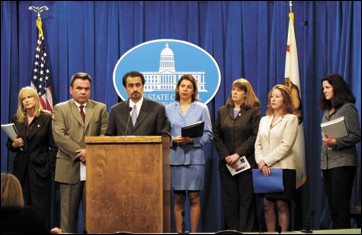Officials outraged by CSU audit findings

Image: Officials outraged by CSU audit findings:State lawmakers gathered in a press confrence last week and expressed their outrage at the auditor’s findings over the CSU spending hundreds of millions of dollars on a computer system.Photo by Jason Lehrbaum/State Horent:
March 19, 2003
CSU officials defended themselves this week after legislators called for investigations into a computer project auditors say is $200 million over budget.
“We’re taking the audit seriously,” said Public Affairs Director Colleen Bentley-Adler for the chancellor’s office. “We’re implementing what the audit has said.”
Bentley-Adler’s comments came Monday after a press conference by state legislators who blasted the CSU for hundreds of millions of dollars of overspending on the Common Management System.
“Heads will roll,” said Calif. Senator Gloria Romero (D – Los Angeles), said last week. “Notice I said ‘heads’, plural.”
An audit of the CMS project said it will run $200 million over the $440 million planners projected in 1999.
But Bentley-Adler defended the project, saying it is vital to keeping the CSU technologically current. Under the old system, each of the 23 campuses used their own software to report all manner of data.
This, according to Bentley-Adler, created gaps in information gathering.
“None of the campuses had a human resources program,” she said. Payroll and other employee data were done on spreadsheets then collated at the chancellor’s office. When completed, the new system is supposed to be universal and be able to be accessed online by all.
California Faculty Association Sacramento President James Chopyak agreed with the benefits of the system, but he questions the timing and cost during the state’s budget crisis.
“It shows how out of touch with reality the chancellor’s office is,” he said.
The same money being spent on CMS could fund 14,000 new classes in the CSU system, Chopyak said.
CMS is a computer program designed by software giant PeopleSoft, Inc. to make payroll, human resources and procurement centralized and is scheduled to be running on all 23 campuses by 2006.
Last week, state legislators blasted California State University officials and called for an investigation of the CSU after an audit report said the system overspent hundreds of millions of dollars on a computer system that may not even work.
Senator Richard Alarcon (D – San Francisco) blasted Chancellor Charles B. Reed’s office and vowed to bring the full weight of the legislature to bear.
“This audit will not collect dust. We will respond to it. They violated our trust with the students,” Alarcon said in a press conference last week.
But Reed brushed aside the criticism, asserting that the audit actually vindicated the five-year-old program.
“The audit nowhere questions the need for the system. It doesn’t say stop doing it, it’s not needed,” Reed said. “Nowhere in the audit does it allege any wrongdoing.”
Alarcon and Assemblyman Manny Diaz (D – San Jose) called for an audit of the CMS after faculty and students, including former Sac State ASI president Artemio Pimentel, voiced concerns last year that the CMS was siphoning money from education, retention and outreach programs.
Since the release of the audit, the Chancellor’s Office has tightened up purchasing and is compiling a financial cost analysis that was not done when the CMS project was initiated, Bentley-Adler said. The analysis will be released by the end of the month, and a formal analysis will be out by the end of the summer, she said.
Diaz said that, unlike other state agencies, there is no accountability for the way the CSU spends on technology. Diaz wants to change that and bring CSU in line with the rest of state.
“Our worst fears were realized,” he said of the auditor’s report.He said more information will be revealed in the coming weeks as the legislators, the Fair Political Practices Commission, and the state attorney general all conduct CMS investigations.
Legislators were especially concerned at the auditor’s finding that Assistant Vice Chancellor of Information Technology Services, David Ernst, received money from PeopleSoft while he was involved in the software selection process for the CMS.
Ernst filed a conflict of interest notice in compliance with the law, and he was open about his relation with PeopleSoft, Bentley-Adler said.
Ernst said he did not take part in the meetings where the software selection was discussed, but the audit said he evaluated the software and was part of the final contract negotiations.
Legislators remain unconvinced.
“These practices are shameful, and we must stop them,” Alarcon said.
Click here to send private feedback about this article to the State Hornet’s News staff.

























































































































